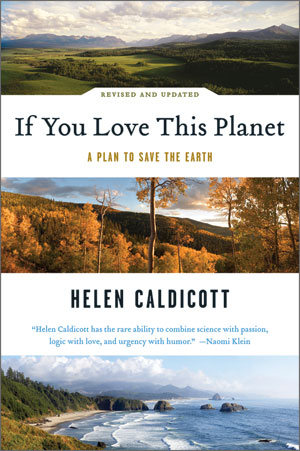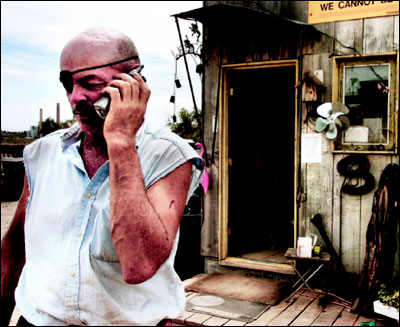 So who doesn’t love this planet?
So who doesn’t love this planet?
Unless you have a few screws loose (or living in extreme poverty or managing to survive in a war zone or some similar predicament), at some basic level, you gotta love living on Earth – for its beauty, sustenance, and mystery. But how are we taking the responsibility to protect, preserve or restore our increasingly degraded planet?
That’s what Dr. Helen Caldicott sets out for her readers of If You Love This Planet: A plan to save the Earth (a revised and updated second edition from W.W. Norton). Climate change, ecological collapse and the damage wrought by the ever expanding global, economic system dominated by big corporations and big government demanded an update of her first edition in 1992.
If You Love This Planet sounds a compelling alarm to the damage one species has managed to cause to the fundamental life-sustaining biological processes on Earth – along with our placid, if not direct, exploitation of our own species for economic gain, power grab, or as a result of omitted (or outright deceptive) information. That species is, of course, homo sapiens. Caldicott’s hard-hitting book dives into the diagnosis and causes, followed by a practical prescription and offers a few simply stated cures.
Dr. Caldicott, a pediatrician, knows her stuff, as the founding president of Physicians for Social Responsibility and a widely recognized champion for nuclear disarmament. She explains how the planet, like a human body, is an organism with “a natural system of interacting homeostatic mechanisms.” If one is diseased, others start to fail.
With a voice both hopeful yet honest, Caldicott possesses a perspective that wraps around the world, dividing her residence between the United States and her homeland, Australia. Thousands of people listen to her weekly national radio program in the US, “If You Love this Planet.” Her book explores planetary issues at length, in 365 tightly woven pages. Her unique, measured and painstakingly documented approach to the topic, drawing force from her expertise as a physician, provides us a compassionate reason to reconnect with the planet on which we depend and evolve, as a species, beyond consumption and economically-blinded self-interest.
“Because the US population represents only 4 percent of the Earth’s people but uses 23 percent of the energy, this lifestyle is not an appropriate model for billions of other people.” With the media’s help, writes Caldicott, millions of Chinese, Africans, Indians, and Latin Americans now want cars, refrigerators, ice cubes in their Coke, and disposable packaging. Like a cancer cell, this growth cannot continue without killing the host. While the first six chapters examine the symptoms of our dying planet – and draws the connections among them – she devotes several more chapters to address the root causes of such malaise. The concluding chapter outlines a plan to heal the planet that (sadly) would baffle CEOs and much of our political leadership. Simple stated, Caldicott’s prescription calls for us to “love, learn, live, and legislate.”
“Only if we understand the beauty of nature will we love it, and only if we become alerted to learn more about the planet’s disease processes can we decide to live our lives with a proper sense of ecological responsibility,” writes Caldicott. “And finally, only if we love nature, learn about its ills, and live accordingly will be inspired to participate in needed legislative activities to save the Earth.”
“We have become addicted to our way of life and to our way of thinking,” explains Caldicott. Corporations, she adds, are addicted to profit and governments to power. We need to break this addiction, not just a recasting of past policies and calling it “change.”
How we Americans choose to live, work and play will determine the fate of the planet. Concludes Caldicott: “America is a land of excitement, change, and opportunity. It is also the country that will determine the fate of the Earth.” If You Love This Planet will provide a firm foundation if you seek to remake and re-imagine a planet where we come care for it as much as we say we love it.
Photography: Courtesy of W.W. Norton and Company, Inc.



Seems to me that those who share Dr. Caldicott’s concerns would be wise to explore widely and deeply the ideas of economist and social philosopher Henry George (b. 1839, Philadelphia; d. 1897, NYC), who wrote “Progress & Poverty,” “Social Problems,” “The Land Question,” “The Science of Political Economy” and several other valuable books, as well as a number of excellent speeches. He provides a set of lenses very different from what most economics students learn at our universities, and one from which our planet and the vast majority of its residents, including most Americans, would benefit.
Henry George was, if you will, a VERY inspired economist. And also very inspiring. He takes the “dismal” out of “dismal science.”
Seems to me that those who share Dr. Caldicott’s concerns would be wise to explore widely and deeply the ideas of economist and social philosopher Henry George (b. 1839, Philadelphia; d. 1897, NYC), who wrote “Progress & Poverty,” “Social Problems,” “The Land Question,” “The Science of Political Economy” and several other valuable books, as well as a number of excellent speeches. He provides a set of lenses very different from what most economics students learn at our universities, and one from which our planet and the vast majority of its residents, including most Americans, would benefit.
Henry George was, if you will, a VERY inspired economist. And also very inspiring. He takes the “dismal” out of “dismal science.”
Good to see a fellow blogger so committed to green ideas and actually fearlessly advocating them….
take care
sudha
Good to see a fellow blogger so committed to green ideas and actually fearlessly advocating them….
take care
sudha
you have a wonderful site!
you have a wonderful site!